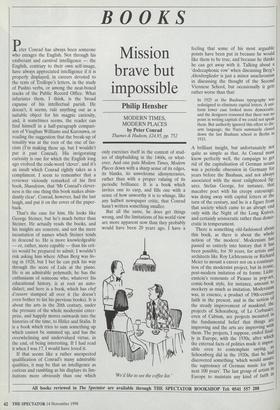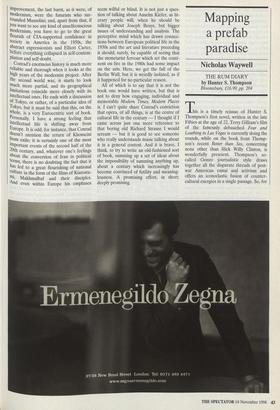BOOKS
Mission brave but impossible
Philip Hensher
MODERN TIMES, MODERN PLACES by Peter Conrad Thames & Hudson, 124.95, pp. 752 titer Conrad has always been someone who enrages the English. Not through his exuberant and carnival intelligence — the English, contrary to their own self-image, have always appreciated intelligence if it is properly displayed, in careers devoted to the texts of Trollope's letters, in the study of Pashto verbs, or among the neat-boxed stacks of the Public Record Office. What infuriates them, I think, is the broad expanse of his intellectual parish. He doesn't, it seems, rule anything out as a suitable object for his magpie curiosity, and, it sometimes seems, the reader can find himself in a half-paragraph compari- son of Vaughan Williams and Kurosawa, or reading the suggestion that the break-up of tonality was at the root of the rise of fas- cism (I'm making these up, but I wouldn't put it past Conrad). His invigorating curiosity is one for which the English long ago evolved the code-word 'clever', and it's an insult which Conrad rightly takes as a compliment. I seem to remember that a reviewer viciously remarked of his first book, Shandyism, that 'Mr Conrad's clever- ness is the one thing this book makes abun- dantly clear'. Conrad, however, had the last laugh, and put it on the cover of the paper- back.
That's the case for him. He looks like George Steiner, but he's much better than Steiner. He actually reads the books, and his insights are concrete, and not the mere incantation of names which Steiner tends to descend to. He is more knowledgeable — or, rather, more capable — than his crit- ics would be prepared to admit; I wouldn't risk asking him where Alban Berg was liv- ing in 1928, but I bet he can pick his way through the score of Lulu at the piano. He is an admirable polymath; he has the enthusiasm of someone who, whatever his educational history, is at root an auto- didact; and here is a book, which has chef d'oeuvre stamped all over it (he doesn't even bother to list his previous books). It is about the arts in the 20th century, under the pressure of the whole modernist enter- prise, and happily moves outwards into the histories of the time, to Hitler and Stalin. It is a book which tries to sum something up which cannot be summed up, and has the overwhelming and undervalued virtue, in the end, of being interesting. If I had read it when I was 17, I would have loved it.
If that seems like a rather unexpected qualification of Conrad's many admirable qualities, it may be that an intelligence as curious and rambling as his displays its lim- itations more obviously than one which only exercises itself in the context of stud- ies of shipbuilding in the 1460s, or what- ever. And one puts Modern Times, Modern Places down with a sharp sense of its edges, its blanks, its unwelcome idiosyncrasies, rather than with a proper valuing of its periodic brilliance. It is a book which invites one to carp, and fills one with a sense of how unworthy it is to whinge, like any halfwit newspaper critic, that Conrad hasn't written something smaller.
But all the same, he does get things wrong, and the limitations of his world view are more apparent now than they probably would have been 20 years ago. I have a `We'd like to see the coffee list.' feeling that some of his most arguable points have been put in because he would like them to be true, and because he thinks he can get away with it. Talking about a `dodecaphonic row' when discussing Berg's Altenberglieder is just a minor anachronism in discussing the thought of the Second Viennese School, but occasionally it gets rather worse than that: In 1925 at the Bauhaus typography was redesigned to eliminate capital letters. A uni- form lower case looked more democratic, and the designers reasoned that there was no point in writing capitals if we could not speak them. But authority ignored this effort to dis- arm language; the Nazis summarily closed down the last Bauhaus school in Berlin 01 1933.
A brilliant insight, but unfortunately not quite as simple as that. As Conrad must know perfectly well, the campaign to get rid of the capitalisation of German nouns was a periodic obsession in Germany for years before the Bauhaus, and not always associated with the most enlightened fig- ures. Stefan George, for instance, that macabre poet with his creepy entourage, was doing away with capital letters at the turn of the century, and he is a figure from that society which came to an abrupt end only with the Night of the Long Knives, and certainly aristocratic rather than demo- cratic in temperament. There is something old-fashioned about this book, as there is about the whole notion of 'the modern'. Modernism has passed so entirely into history that it has been possible, for 30 years, for artists and architects like Roy Lichtenstein or Richard Meier to mount a career not on a continua- tion of the modernist project, but in ironic, post-modern imitation of its forms; Licht- enstein's remounts of Picasso in pop-art, comic-book style, for instance, amount to mockery as much as imitation. Modernism was, in essence, a product of 19th-century faith in the present, and in the notion of the steady improvement of mankind; the projects of Schoenberg, of Le Corbusier, even of Cubism, are projects mounted in the fundamental belief that things are improving and the arts are improving with them. The projects, I suppose, ended furl" ly in Europe, with the 1930s, after which the external facts of politics made it impos- sible even to contemplate saying, aS, Schoenberg did in the 1920s, that he had discovered something 'which would assure the supremacy of German music for the next 100 years'. The last group of artists in Europe to maintain any kind of faith in improvement, the last burst, as it were, of modernism, were the futurists who sur- rounded Mussolini; and, apart from that, if You want to see any kind of unselfconscious modernism, you have to go to the great flourish of CIA-supported confidence in society in America in the 1950s, the abstract expressionists and Elliott Carter, before everything collapsed in self-contem- plation and self-doubt.
Conrad's enormous history is much more reliable and thorough when it looks at the high years of the modernist project. After the second world war, it starts to look much more partial, and its geographical limitations coincide more closely with its Intellectual ones. He ends with a discussion of Tokyo, or rather, of a particular idea of Tokyo, but it must be said that this, on the whole, is a very Eurocentric sort of book. Personally, I have a strong feeling that intellectual life is shifting away from Europe. It is odd, for instance, that Conrad doesn't mention the' return of Khomeini from exile; it is certainly one of the most important events of the second half of the 20th century, and, whatever one's feelings about the conversion of Iran in political terms, there is no doubting the fact that it has led to a great flourishing of national culture in the form of the films of Kiarosta- nli, Makhmalbaf and their disciples. And even within Europe his emphases seem wilful or blind. It is not just a ques- tion of talking about Anselm Kiefer, as lit- erary people will, when he should be talking about Joseph Beuys, but bigger issues of understanding and analysis. The perceptive mind which has drawn connec- tions between European political life in the 1930s and the art and literature preceding it should, surely, be capable of seeing that the monetarist fervour which set the conti- nent on fire in the 1980s had some impact on the arts. Here, we get the fall of the Berlin Wall, but it is weirdly isolated, as if it happened for no particular reason.
All of which is to say that it is not the book one would have written, but that is not to deny how engaging, individual and memorable Modern Times, Modern Places is. I can't quite share Conrad's conviction that opera, of all things, is at the centre of cultural life in the century — I thought if I came across just one more reference to that boring old Richard Strauss I would scream — but it is good to see someone who really understands music talking about it in a general context. And it is brave, I think, to try to write an old-fashioned sort of book, summing up a set of ideas about the impossibility of summing anything up, about a century which increasingly has become convinced of futility and meaning- lessness. A promising effort, in short; deeply promising.



















































































 Previous page
Previous page